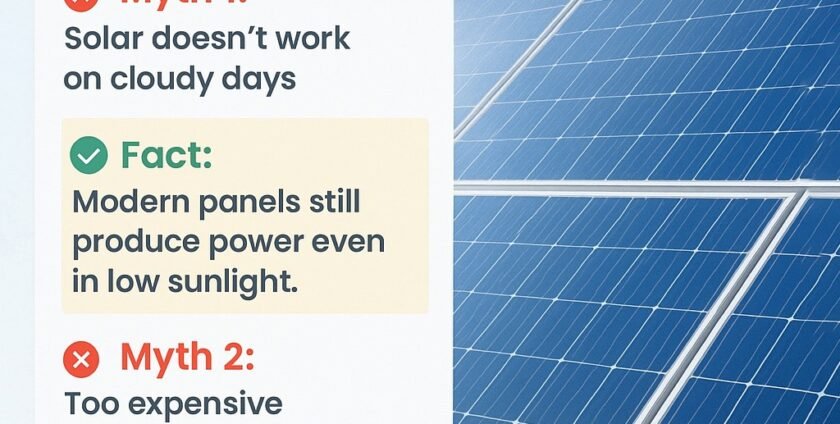
Top Myths About Solar Panels in Pakistan—Busted!
Uncover the truth behind common solar myths Pakistan. This blog explains real facts about solar panels, their cost, performance, and benefits in all weather conditions. Learn how solar systems in Pakistan offer long-term savings, low maintenance, and reliable power for homes and businesses.
Introduction
As solar energy becomes more popular in Pakistan, many homeowners are considering switching to renewable power. However, a number of solar myths in Pakistan often confuse people and stop them from making the right decision. From doubts about performance to misconceptions about cost, these myths prevent people from understanding the real benefits of solar power.
In this article, we’ll uncover the top myths about solar panels in Pakistan and reveal the truth behind them, helping you make a smarter energy choice for your home or business.
Myth 1: Solar Panels Don’t Work on Cloudy or Rainy Days
Reality:
This is one of the most common solar myths in Pakistan. Solar panels do not need direct sunlight to work; they only need daylight. Even on cloudy or rainy days, panels can still generate electricity—although at slightly reduced efficiency. Modern solar technology, especially Tier-1 panels from brands like Inverex, Longi, and Canadian Solar, performs well even in diffused sunlight.
Myth 2: Solar Systems Are Too Expensive
Reality:
While solar systems may seem costly initially, the return on investment (ROI) is excellent. You can recover your cost within 3 to 5 years through reduced electricity bills. After that, you enjoy free power for the next 20+ years. Plus, with government net metering incentives and declining equipment prices, solar is more affordable than ever in Pakistan.
Myth 3: Solar Panels Require Too Much Maintenance
Reality:
Solar panels are low-maintenance. You only need to clean them every 2–4 weeks to remove dust and debris. The inverter may need an occasional service check, but there are no major ongoing costs. Reputable companies like IMH Technologies provide full installation and maintenance packages to keep your system running efficiently.
Myth 4: Solar Energy Doesn’t Work During Load Shedding
Reality:
This myth depends on the type of solar system you install.
-
On-grid systems stop working during power outages for safety reasons.
-
Hybrid or off-grid systems, however, continue to provide electricity using battery backup.
For areas with frequent load shedding, a hybrid solar setup is the best choice.
Myth 5: Solar Panels Damage Roofs
Reality:
Professionally installed solar panels do not damage roofs. In fact, they often protect the roof from harsh weather and UV radiation. Installers use specialized mounting structures that ensure the integrity of your roof remains intact.
Myth 6: Solar Panels Have a Short Lifespan
Reality:
High-quality solar panels have a lifespan of 25 years or more. Most manufacturers offer warranties ranging from 10 to 25 years, and even after that, panels typically continue producing energy at reduced efficiency. This makes solar a long-term, reliable investment.
Myth 7: Solar Power Isn’t Suitable for Pakistan’s Climate
Reality:
This is completely false. Pakistan receives over 300 sunny days per year, making it one of the best countries for solar energy generation. The warm and dry climate is perfect for solar performance, especially in cities like Faisalabad, Lahore, Karachi, and Multan.
Myth 8: Solar Systems Can’t Run Heavy Appliances
Reality:
With the right system size, solar energy can easily run ACs, refrigerators, washing machines, and motors. A 5 kW–10 kW solar system is sufficient for most medium-to-large homes in Pakistan. For factories and commercial setups, 20kW+ systems are available.
Myth 9: Solar Panels Stop Working After a Few Years
Reality:
Solar panels are built to last. Even after 20 years, panels can still operate at around 80–85% efficiency. Regular cleaning and occasional maintenance can extend their life even further.
Benefits of Using Solar Energy in Pakistan
-
Save Up to 90% on Electricity Bills
-
Eco-Friendly and Sustainable Energy Source
-
Increased Property Value
-
Reliable Power During Load Shedding
-
Government Net Metering Support
Conclusion
It’s time to stop believing in outdated myths and start trusting facts. Solar energy is affordable, reliable, and ideal for Pakistan’s environment. With professional installation and high-quality equipment, you can enjoy decades of clean and cost-effective power.
For expert consultation, installation, and maintenance, contact IMH Technologies, your trusted solar partner in Pakistan.
Frequently Asked Questions (FAQs)
1. Do solar panels work at night?
No, solar panels don’t produce energy at night. However, hybrid systems store daytime energy in batteries, which can be used after sunset.
2. How long do solar panels last in Pakistan?
On average, solar panels last 25 years or more, with inverters typically lasting around 10–12 years.
3. Can solar panels work during load shedding?
Yes, but only if you install a hybrid or off-grid system with batteries. On-grid systems stop working during outages.
4. Are solar panels worth it in Pakistan?
Absolutely. With low maintenance, high sunlight exposure, and net metering, solar systems offer great savings and sustainability.
5. Which brand of solar panels is best in Pakistan?
Some of the top-performing brands are Inverex, Longi, Canadian Solar, Trina Solar, and Tesla Solar.
- By: IMH Technologies
- 0 comment

Leave a Reply